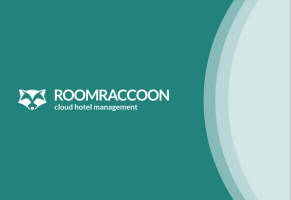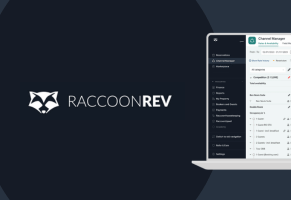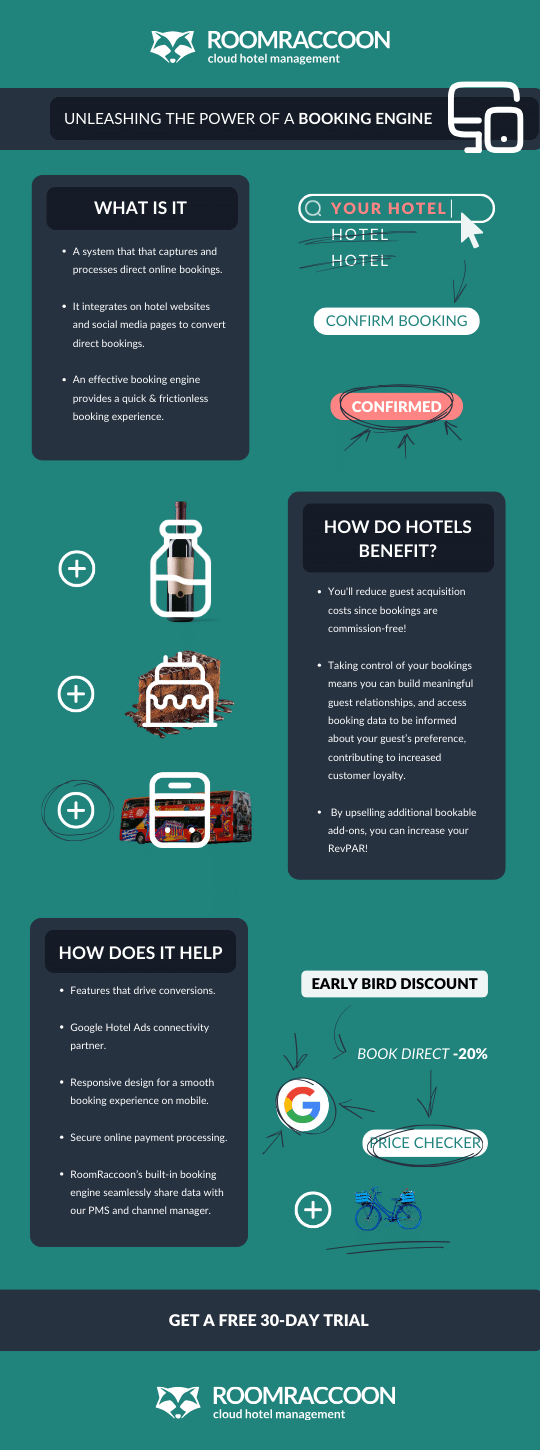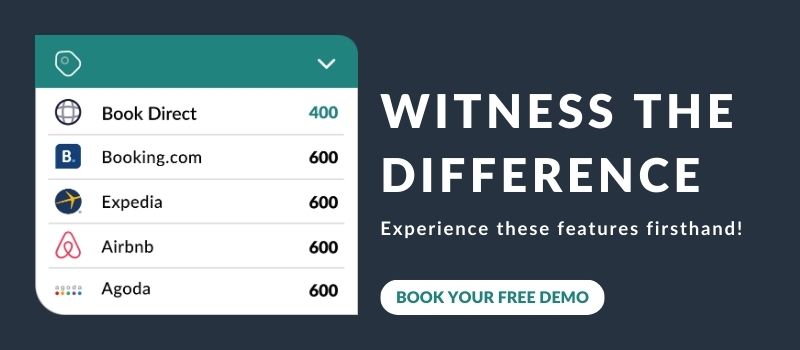CORE PRODUCT
What is a Hotel Booking Engine?
November 16, 2023 Nicky. M
Share this post
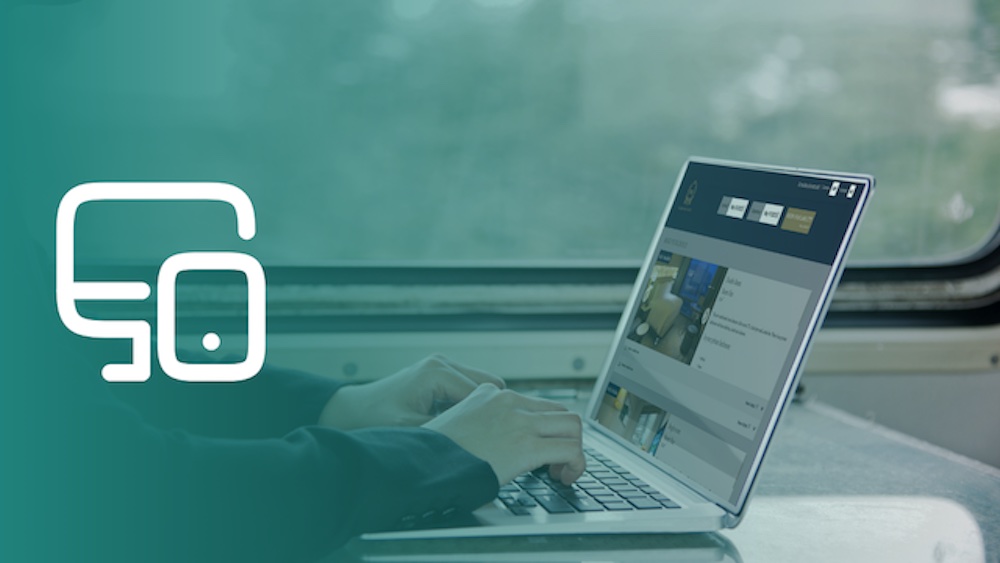
A hotel booking engine is a system on your hotel’s website and social media pages. Its main job? To smoothly handle direct online bookings without the headache of commission fees. This tool lets you fine-tune your sales approach, build stronger guest relationships, and boost revenue.
While online travel agents can spread the word about your hotel to a broader audience, the downside is dealing with hefty commission fees. The online booking engine steps in to help your hotel strike a balance in its distribution strategy, preventing online travel agents from taking over and cutting into your earnings.
This blog provides a comprehensive guide to hotel booking engines, including their functionality, little-known benefits, and how hotels can leverage them.
Why is a Booking Engine Important for Your Hotel?
A booking engine is easily the most important tool to have on your hotel website today. It allows guests to book rooms online in a way that’s convenient and secure. Without it, you may be unknowingly turning away modern guests accustomed to receiving immediate information about prices and availability on third-party booking channels.
Guests overwhelmingly prefer using an online booking engine for several reasons:
- The convenience of self-service: Travelers can check room availability and pricing in their preferred language and currency without needing to speak to anyone.
- They trust online booking: Guests appreciate the security and peace of mind provided by secure online payments and instant booking confirmation. All guest data is stored safely and accessible in one convenient location.
- The direct booking discounts and exclusive add-ons: Guests often look for a discount code or special offer on the property’s website. Plus, many hotels offer exclusive packages and add-ons on their websites not available elsewhere.
- They can book quicker: Guests can complete their booking in 5 simple steps outlined below, and you can avoid any potential booking errors resulting from email threads and phone calls.
- They prefer direct communication: In the post-pandemic world, guests are increasingly opting for direct communication with hotels instead of relying on intermediaries.
How Does an Online Booking Engine Work?
An online booking engine works by integrating the application script into your hotel’s website and securely processing reservations made through your site. Then, the booking and guest data is transferred to your property management system, where it becomes visible on your reservations calendar and can be conveniently accessed.
There are many booking engine software providers, and each booking engine varies in functionality and appearance. However, the typical structure of a booking engine involves a page that shows your rates and availability in real time, allowing potential guests to enter their preferred stay dates.
This input triggers the booking engine to display the available room options to prospective guests. Once they have made their selection, they are taken to a secure payment or confirmation page to complete their booking.
It’s worth noting that if the booking process takes too long with too many steps, guests won’t follow through. RoomRaccoon offers a simple, quick, and secure direct booking process that provides personalized results in 5 easy steps.
RoomRaccoon’s intuitive 5-step direct booking process powered by our booking engine.
Step 1: The booker/guest selects the dates for their stay and selects the number of accompanying guests, including adults and/or children (with age specifics). If the hotel has provided a discount code, guests can use it to redeem the discount during their booking.
Step 2: The booker/guest views available rooms or packages with image galleries and pricing based on the provided details and selects the most suitable room/s.
Step 3: The booker/guest can also conveniently choose to include add-ons like a bottle of wine or a flower bouquet to personalize their stay.
Step 4: After selecting “book now,” the booker/guest is directed to a secure payment page to complete the payment process. If the booker/guest has stayed with you previously, the system will recognize them and can save time by automatically filling in their details, including preferences. The system will also apply negotiated rates.
Step 5: The booker/guest receives a booking confirmation email with information about their upcoming stay.
Key Benefits of Using an Online Booking Engine
“I prefer to use OTAs to sell, market, and manage my bookings because it is simpler.” – Hotel manager
Sure, OTAs are convenient as they handle customer relations, booking management, and payments on behalf of hotels. However, the major downside is the hefty commission fee of approximately 18% per booking you pay for using this service. That’s why striking a strategic balance between OTAs and direct business proves more financially rewarding. Besides, prioritizing direct bookings not only saves costs but also unlocks little-known perks.
Here are the key benefits of integrating a booking engine on your hotel’s website:
1. Improves the guest experience and fosters guest loyalty
Guests who book a stay directly through a hotel’s website have a higher likelihood of returning. This is because guests have a personalized experience right from the start instead of taking the impersonal OTA route. They can interact directly with your hotel’s booking engine, which often provides more transparent information about available rooms, add-ons, prices, and policies.
2. Captures bookings through the OTA billboard effect
OTAs can be powerful marketing tools that indirectly boost your direct bookings. This is due to the behavior of tech-savvy travelers who, upon discovering a hotel listed on an OTA, often visit the hotel’s website in search of better deals or additional details. By seamlessly integrating a booking engine offering competitive direct booking rates, you seize the opportunity to convert these interested visitors into direct bookings.
3. Allows you to get strategy savvy with booking data
An online booking engine captures guest and booking data directly, empowering hotels to make better-informed decisions. You can choose the type of guest data you want to collect, such as name, email address, gender, time of arrival, date of birth, dietary requirements, and purpose of stay (leisure/corporate/business).
What’s more, digital marketers in the hotel industry can employ conversion tracking codes (Google Tag Manager) to meticulously monitor a range of events, including adding rooms and add-ons to carts, initiating checkouts, and completing bookings.
4. Creates flexibility on the types of promotions and packages you offer
Unlike with OTAs, you are not limited by what you can sell and promote. Your booking engine can easily offer unique packages, last-minute deals, and extended stay discounts to differentiate your property. Even better, your property amenities won’t be hidden anymore, as guests can include add-ons like a bottle of champagne or a guided tour while booking to enhance their stay!
5. Simplifies the administration process and provides instant gratification
In a world of instant gratification, travelers today are less inclined to fill out inquiry forms on websites. Instead, they can quickly check your availability and rates using your online booking system. At the same time, your staff saves time responding to email inquiries and accepting reservations over the phone. This also ensures everyone can access live occupancy information, improving efficiency.
9 Must-Have Features of an Internet Booking Engine
Nowadays, nearly all hotels have their own website equipped with an online booking engine that allows guests to self-serve for instant gratification. However, not all booking engines are created equal. As the hospitality industry continues to evolve, guests are becoming more tech-savvy, and competition is getting tougher.
That’s why you need an online booking system that not only processes bookings but is equipped with features that can help convert more visitors into actual bookers.
Below, we discuss a few top-rated features of RoomRaccoon’s hotel booking engine that give our hotel partners the ultimate edge.
1. A price comparison widget
Today’s savvy travelers prefer to use Online Travel Agencies (OTAs) for initial research, but they often switch to the hotel’s own website for better rates. By implementing a price comparison widget like Raccoon Price Checker, you can save time for your guests by displaying your rates on both OTAs and your own website. This will help guests see that they’re getting a better deal by booking directly, and you avoid hefty commission fees.
2. Discount code generator
Your booking engine should be able to generate custom discount codes that can be easily redeemed through the booking engine, opening up a world of promotional possibilities to attract and retain loyal customers. The most common way RoomRaccoon users utilize this feature is by offering a direct booking discount on their website through a pop-up banner.
Tip: One way to encourage repeat bookings is by sending past guests an email with a direct booking discount code. You can make this even more special by sending it to them on their birthday or other special occasions.
3. Multi-property dropdown
Do you run a multi-property hotel? Instead of having an individual booking engine for each property, using a multi-property booking engine is more efficient for guests to select a location from a drop-down menu. They can view the availability of the property in their desired location and book accordingly. As a hotelier, you benefit from centralized management and improved occupancy across your entire portfolio.
4. Add-ons and upsells
Today’s guests are seeking more than just a place to sleep; they want an experience. They are willing to spend more on additional amenities that can enhance their stay. As a hotelier, it is crucial to take advantage of this opportunity by utilizing a booking engine that enables guests to book add-ons for other services you offer. This will ultimately increase your total revenue per available room.
5. Room Allotment
If you cater to group events like functions and weddings, you might be aware of the difficulties of coordinating room allocation with a travel booker. One of the most valuable features of RoomRaccoon’s booking engine is Room Allotment, which allows you to assign rooms to a group profile and send a custom booking engine link to the wedding planner or travel agent.
The custom booking engine will only display and allow bookings for the rooms that have been allocated for the event. In the case of a wedding, guests can book their own rooms and select the add-ons they want. No hassle!
6. White labeling
You should have the option to customize the booking engine with your brand’s identity. White labeling ensures that your brand remains front and center throughout the entire booking process. From the URL to the confirmation documents, it’s all about your hotel’s identity. This consistency helps in building and reinforcing brand recognition.
7. Yield management
Seasonal rates are important for hotels. However, it’s worth noting that demand for hotel rooms can also fluctuate outside of peak season, especially during major events. For instance, hotel occupancy rates soared to 90% during Taylor Swift’s Eras tour. This highlights the significance of monitoring demand and adjusting room rates accordingly to maximize revenue and occupancy rates. A booking engine with intelligent pricing tools like a Yield Manager can make a big difference to your bottom line.
Learn more about yield management in the hotel industry.
8. Booking proposal document
It is highly probable that you will receive a special booking query from a guest. However, you can still automate the way you manage them with RoomRaccoon’s booking proposal document. This amazing feature will assist you in managing your email inquiries and phone calls more efficiently.
With this feature, you can send a proposal to your guest’s email inbox along with a payment link that will expire after a certain time. When the guest makes the payment, the booking will be confirmed automatically in RoomRaccoon’s calendar. No follow-ups. No hassle!
9. Hotel website templates
Need a website to integrate your booking engine? Look out for hotel booking engine providers that offer easy-to-customise website templates! With RoomRaccoon, you can choose from our standard or premium design packages to create a stunning hotel website that converts visitors into paying guests. What’s more, you can customize your booking engine page with your brand colors and logo to maintain a consistent brand experience.
10 Questions: What to Ask Before Choosing a Booking Engine for Your Hotel Website
Shopping around for booking engine software? Be prepared! Here are key questions to ask vendors to help you better understand the inner workings and ensure you make the right investment.
1. How can I manage my rates and availability?
It’s crucial to have a booking engine that is connected in real time to a reservation or property management system. This system stores your inventory, including availability and rates, and communicates essential data instantly. With this two-way connection, you can easily add and modify things like rates and add-ons and provide your customers with accurate and up-to-date information.
What’s more, connecting your booking engine to a channel manager allows you to synchronize all your sales channels and access powerful performance reports, which enables you to compare your direct reservations with third-party bookings.
2. Is it quick and user-friendly?
The process of booking a room should be quick, trustworthy, and hassle-free.
Prospective guests should be able to select their arrival and departure dates and number of guests to view suitable room options. What if you’re sold out for a particular date range? RoomRaccoon’s booking engine automatically suggests the closest alternative dates to diversify options. And, should you run multiple properties, our multi-property dropdown menu is ideal for increasing your occupancy across your entire portfolio.
Buyer’s Tip: It’s helpful to test the booking process from the point of view of a potential guest.
3. Is it responsive?
Mobile bookings are becoming increasingly popular.
Your booking engine should adjust to the different types of devices travelers are using so that the booking experience is just as smooth on a mobile or tablet as on the desktop version. The text and images should be clear and easily clickable.
Buyer’s Tip: Google favors websites that are functional on both desktop and mobile. As a result, it sends more traffic to websites that provide a better user experience for mobile users.
4. How can I cater to international travelers?
Nobody enjoys the hassle of dealing with currency conversion while booking online. International travelers represent a highly profitable market to target, as they tend to stay for longer and indulge in room upgrades and additional amenities.
To cater to this demographic effectively, it’s important that the booking engine you choose is multilingual and can seamlessly handle various currencies.
5. Can I promote multiple rate plans and upsell additional services?
OTAs typically enforce fixed-rate plans, but the advantage of having your own website booking engine is the flexibility to tailor your rate plans and packages to align with your business goals and delight your guests.
This customization allows you to offer varying rates for the same room, catering to different packages and inclusions, such as a bed and breakfast rate or room only, refundable or non-refundable rates for the same room. RoomRaccoon’s booking engine takes it a step further by enabling your guests to personalize their stay with a variety of add-ons they can book along with their accommodation. Quite convenient!
6. Can I process secure online payments?
An essential part of owning your booking experience is having complete control over payments and booking conditions. The option to receive full or partial payment during booking can prevent last-minute cancellations and no-shows, providing you with peace of mind. RoomRaccoon also offers the convenience of online check-in payments, allowing guests to complete their registration and pay a few days before arrival.
When it comes to online payments in the hospitality industry, it’s important to prioritize secure and reliable online payments. To achieve this, it’s recommended to use a payment gateway that meets high-security standards like 3D secure two-factor authentication. RoomRaccoon’s integrated payment gateway, RaccoonPay, ensures the safe exchange of payment data between hotels and guests. It also centralizes all financial information in a single location, making it easier to record and monitor transactions.
7. Will I pay a commission for direct bookings?
The beauty of managing your own booking experience is that you get to keep all your revenue. However, not all booking engine providers offer this perk. It’s crucial to inquire whether they charge any commissions on your bookings when you’re exploring new software options.
RoomRaccoon has processed over one million commission-free direct bookings!
8. Can I connect my booking engine to Google?
If you’re serious about bolstering your direct bookings, you should include Google Hotel Ads (GHA) in your distribution strategy. The Pay-Per-Stay program launched in 2020 at an advantageous time when cancellations were at an all-time high during the pandemic.
Instead of paying for each click or transaction, hotels could finally pay Google a commission only after the guest’s stay occurred. Hotel managers highly favor the no-risk model, which is responsible for a large chunk of direct revenue.
Unlike OTAs, GHA sends guests directly to your hotel booking engine, giving you complete control over the booking experience. RoomRaccoon is a certified connectivity partner of Google, which means you can activate the ads instantly—no set-up hassle.
9. How can I track my online marketing campaigns?
Do you run advertising campaigns on platforms like Google or Meta? If you do, it’s crucial that your booking engine enables you to use conversion tracking codes from these platforms. This will give your marketing team insights into how effective your booking engine is in converting visitors into bookings.
With RoomRaccoon’s booking engine, you can use Google Tag Manager (GTM) to capture and send specific events to GA4.
Learn more about the type of events you can track here.
10. Can I get a free booking engine trial?
Before you decide to commit, it’s important to take advantage of a trial period. During this time, you should try out different rate configurations, check out customization options, and see how the booking engine looks from a guest’s point of view. This hands-on experience will help you make informed decisions and feel more confident about your chosen software.
RoomRaccoon offers a no-strings-attached free trial for 30 days. Give it a go today!
Other Useful Tools to Use With Your Hotel Website Booking Engine
A booking engine is only as good as its integration with other systems. It’s crucial that a booking engine can harmonize with other systems you utilize to guarantee the precision and efficiency of your property’s backend operations.
A practical solution for small and independently owned hotels is all-in-one hotel management software that’s complete with the core tools you need to operate your business effectively, including a booking engine, property management system, channel manager, and Google Hotel connection.
1. Property Management System (PMS)
A PMS is software that controls your property’s back and front-end operations and is an important integration with any booking engine. With modules such as Property Set-Up, Reservations, Bookers & Guests, Documents, Reports, Finance, Housekeeping, and Payments, RoomRaccoon’s PMS offers you a complete property management experience.
2. Channel Manager
A channel manager is a very important tool that allows hotels to sell on multiple channels simultaneously. It ensures that your availability is always up-to-date, no matter where your guests book; be it directly on your website or through an OTA like Booking.com. This saves you time and effort and prevents overbookings.
RoomRaccoon was voted the World’s Best Channel Manager by the World Travel Tech Awards in 2023.
3. Google Hotel Ads
Another important tool you can use alongside your booking engine is Google. Google hotel ad campaigns not only showcase your competitive direct rates but also offer a seamless booking option, directing potential guests straight to your booking engine. Use it to compete with major OTAs and enjoy more direct bookings. Keep in mind that Google only works with certified booking engine partners like RoomRaccoon.
Learn more about Google Ads for hotels in our comprehensive guide.
How to Implement a Hotel Website Booking Engine
Once you have chosen a provider, it should be straightforward to implement your hotel website booking engine.
Most online booking engine providers can integrate with your existing website without any problems. If you don’t have a website yet, don’t worry; there are providers like RoomRaccoon that offer website builders that make it easy to create one.
Use RoomRaccoon’s Hotel Booking Engine to Boost Direct Bookings and Delight Guests
The RoomRaccoon hotel booking engine not only processes direct booking on your website but is engineered with features that encourage higher conversion rates and booking values.
Robust, simple, and fully optimized, RoomRaccoon’s booking engine will help you boost direct bookings quickly and grow your hotel’s revenue.
- Increase direct revenue: Take direct bookings without commissions from your website, social media pages, and metasearch channels like Google.
- Enhance guest experience: Create a frictionless booking experience, offer personalized stays, and be optimized for any device.
- Stay in control and keep it simple: Enjoy effortless management of your reservations, processing of payments, and valuable insights.
Experience it yourself by booking a free demo today!
Follow us
Nicky. M
Nicky is RoomRaccoon's Senior Content Manager, combining a love for travel with a practical approach to improving hotel performance through tech and insightful tips. Join her journey where travel, hospitality, and technology meet.
Related Posts
Subscribe to our newsletter for more on the latest hospitality & RoomRaccoon updates delivered straight to your inbox!
